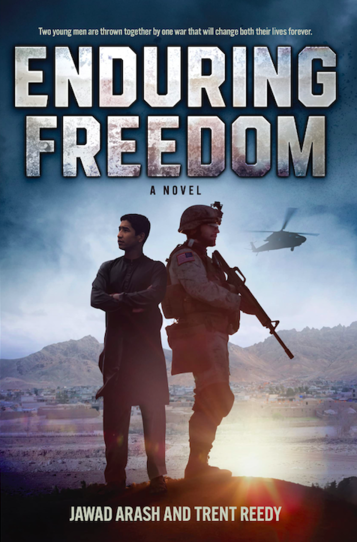Trent Reedy and Jawad Arash are the authors of the book Enduring Freedom. The novel follows two boys, Baheer and Joe. Baheer is an Afghan teen, and Joe is an American army private. The two boys end up meeting after Joe gets shipped out to Afghanistan, and they learn alot from each other . The book explores the meaning of learning to understand someone and how educating oneself can be very beneficial to overcoming ignorance. YEM was able to speak with Trent Reedy about their book and the whole writing process before they took over the twitter account for the day!
Young Entertainment Mag: What made you want to write Enduring Freedom together?
Trent Reedy: Jawad Arash and I have stayed in touch ever since I returned home from the war in Afghanistan in 2005. This was a small miracle given the lack of electricity, internet, and computers in Afghanistan back then, but the country soared ahead in technological progress, so there were e-mails and later social media connections. One day Jawad mentioned an interest in writing books in English, and then for some reason I asked, “Where were you on 9/11?” Jawad’s answer was incredible—shocking and terrifying really. I asked him when he first encountered an American military presence in Afghanistan. His answer is in a scene Enduring Freedom. I asked when he first saw American ground troops. The first soldier he saw was me, in our first conversation at the beginning of our friendship. Right there, I knew we had the seed for our story.
YEM: When did you know you wanted to be a writer?
Trent: I always loved pretending and later telling stories, but the idea of being a writer, professionally, didn’t take hold until about the sixth grade. We were assigned to write a story, and I spent forever scrawling onto lined notebook paper a story, six pages long. Of course, in those days, teachers used to make us recopy by hand everything we wrote as a means of teaching us about revision, so the six pages came back to bite me. But I realized then that writing is what I wanted to do most. Many years later I expanded that story idea into what became my second novel Stealing Air.
YEM: What was the inspiration for the book?
Trent: Enduring Freedom is inspired by the horrific tragedy of 9/11 and the war in Afghanistan that resulted from that horrible day. I’ve written about the war in Afghanistan a lot in the past because serving in that war had a profound effect on my life. But I’d never written a novel from the point of view of an American soldier serving in that war. I’d tried, but I couldn’t get it right. The inclusion of Jawad’s Afghan protagonist Baheer, gave me the framework I needed. Because the war in Afghanistan wasn’t just about American soldiers. It was about an alliance between Americans and good Afghan people in opposition to the evil Taliban. In a way, Jawad Arash and his experiences inspired this book.
YEM: What can readers expect from your book?
Trent: Enduring Freedom is the closest to the truth of 9/11 and the Afghanistan war experience as any novel is likely to allow. It’s a deeply personal book, closely inspired by Jawad’s life under the Taliban and subsequent coalition military presence as well as it is inspired by my own military service. There’s no other book like it, in that it explores both the American military and Afghan perspectives conveyed directly from two people who lived those experiences.
YEM: What is something you learned about from each other during the writing process?
Trent: I think we learned a lot about patience and cooperation! It’s hard co-writing a novel from opposite sides of the planet. When I woke up in the morning, ready to go to work writing, Jawad would be going to bed, and vice versa. So if, for example, I was writing, and had questions for Jawad about some point of Afghan culture, I had to relax and wait for Jawad’s morning. It was tricky, but we developed a good rhythm
YEM: How long did the writing process take?
Trent: Enduring Freedom was a difficult novel to write. It has the more complex structure of following two different characters from opposite sides of the world, and timing their movements so that they came together at the right place in the book. Also, an Army deployment is full of a lot of boredom. Deployments definitely don’t follow the classic rising action-climax-resolution novel pattern, so a lot of rearrangement of events was required, and this all took a very long time.
YEM: What did the writing process look like?
Trent: Jawad and I loosely agreed on the events that had to take place in each chapter, including how our characters would react to and be changed by those events. Jawad wrote the Baheer chapters. I wrote the PFC Joe Killian chapters. Then we’d each review the other’s work. Sometimes I asked Jawad to clarify certain Afghan expressions or cultural idiosyncrasies to help our American audience better understand Afghanistan. Jawad was great to work with, always eager to go to work, to share with Americans more of the truth of Afghanistan and the war there than they generally get to see or otherwise experience.
YEM: If there was one thing every reader could take away or learn from the book what would it be?
Trent: In Enduring Freedom Private First Class Joe Killian has some terrible ideas about Afghanistan and the Afghan people. He’s very angry about the 9/11 attacks and his Army training has led him to believe he’s about to spend every day of his time in Afghanistan deep in deadly combat. It takes a while for Killian to realize the people of Afghanistan aren’t his enemy, and that he can make friends with people like Baheer. This emotional and intellectual journey mirrors my own of course, so I’d like readers to understand that Afghanistan is a great place with a great people who were united with us in our common struggle against a terrible enemy in the Taliban and Al Qaeda.
YEM: What is some advice you have for those wanting to become authors as well?
Trent: 1. Read always. Read hundreds and hundreds of books, especially those similar to what you want to write.
2. Write a lot, and continue to learn about writing craft. The best way to learn is through practice.
3. Never ever give up. Continue to work toward your writing dream even when nobody else believes you can do it, even and especially when you yourself doubt the possibility of your writing success. You only fail when you quit. Otherwise, you simply haven’t succeeded yet. Never forget the power of yet.
10. What is the biggest difference when it comes to writing a book alone and with someone else?
What’s great about co-writing a novel is you’re not alone. You have someone else along for the journey to celebrate the successes and work through the challenges. I am honored to have been blessed with Jawad’s friendship. Even though we’re over 6,000 miles apart, it was great to be teamed up with him to write Enduring Freedom. This book is, I think, a deeply personal, labor of love for the both of us.
YEM: Are you thinking of writing other books together?
Trent: Jawad and I have discussed the possibility of co-writing another book together. When you find a working partnership that works as well as ours, you don’t throw that away. Enduring Freedom is a good book, an important book that means so much to us, so who knows what we could come up with if we set out to cowrite another novel.
YEM: Was there a part of the book that you most enjoyed writing?
Trent: I really like so many scenes from Enduring Freedom, but one that stands out to me is a Christmas scene. The Afghan protagonist Baheer visits the American Army base outside his city, bringing some terrific Afghan naan for a gift for the American protagonist PFC Joe Killian. It’s Christmas Eve and Baheer, Joe, and Joe’s fellow soldiers are joking around. Then in the Christmas Eve worship service, the Americans are joined by Baheer and some of the Afghan interpreters. They talk about the similarities and differences between the birth of Jesus in the Bible and in the Quran, as well as other things the two books have in common. This scene is based on the Christmas service we shared with some of our Afghan friends. We all got along so well. It was fun. I wanted to share this experience with readers through fiction as my means of asking why the world can’t get along as easily as we all did that night. I enjoyed that scene very much.
YEM: What was one thing you learned about your writing while writing this book?
Trent: While writing Enduring Freedom I learned that, over the years I’ve been writing professionally, I’ve become much better at revision, more willing to make huge cuts or major changes to early drafts, to rewrite so much of the manuscript that it is as though I’m writing a whole new book. This book took an enormous amount of work and revision, but I’m confident that all those changes resulted in something that’s important, and I hope it’s a book that readers will enjoy.
Also, I learned I can co-write, and I learned how great the co-writing process can be!





